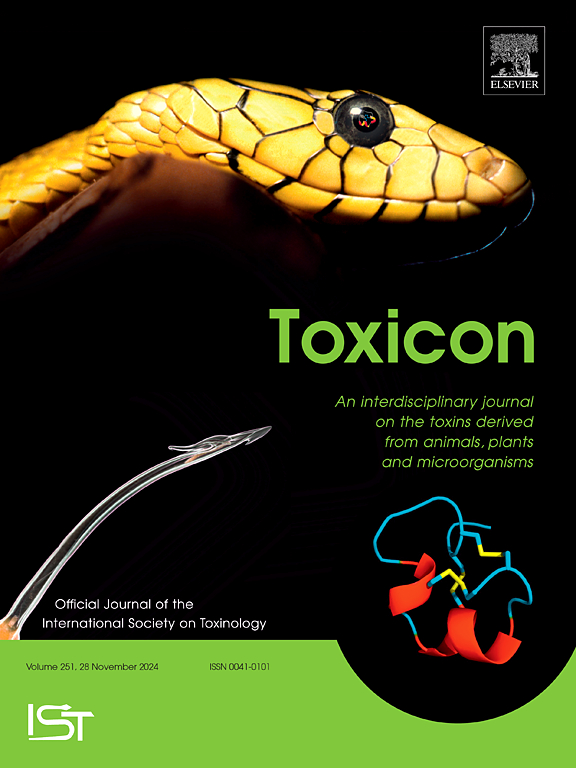Scorpion venom as a natural peptide source for innovative therapeutic solutions: A comprehensive review of its potential in emerging medical frontiers
IF 2.4
4区 医学
Q2 PHARMACOLOGY & PHARMACY
引用次数: 0
Abstract
Scorpion venom is a complex mixture and an abundant natural source of bioactive components, including peptides and other molecules that exhibit a wide range of therapeutic effects despite its notable neurotoxic effects. This review focuses on these bioactive components and their therapeutic potential. Among the most potent molecules in scorpion venom are peptides with high specificity and affinity for ion channels, making them excellent candidates in drug development. The most critical therapeutic application is scorpion venom as an anticancer agent. Several venom peptides have selectivity toward cancer cells by inducing disruption in tumor growth and metastasis. Moreover, scorpion venom can modulate the immune system and thus can provide treatments for autoimmune diseases through its action on ion channels in lymphocytes. Neurological effects, especially in neurological disorders caused by venom peptides, come through an action against sodium and potassium channels. In pain management, scorpion toxins act upon the sodium channels in sensory neurons and provide analgesic effects. Additionally, much attention has been paid to antimicrobial properties of scorpion venom. Peptides isolated from venom have demonstrated strong, broad-spectrum inhibitory activities against bacteria, fungi, and viruses, which have opened a new avenue to develop antimicrobial therapies. Anti-inflammatory and antioxidant effects extend the therapeutic possibilities of scorpion venom further. Venom peptides may reduce inflammation and oxidative stress and relieve diseases associated with inflammation and oxidative stress. This study aims to provide a comprehensive review of the therapeutic effects of scorpion venom, emphasizing its potential in drug development for a wide range of diseases.

蝎子毒液作为创新治疗方案的天然肽源:其在新兴医学前沿的潜力的全面审查
蝎子毒液是一种复杂的混合物,含有丰富的天然生物活性成分,包括多肽和其他分子,尽管具有显著的神经毒性作用,但仍具有广泛的治疗作用。本文就这些生物活性成分及其治疗潜力进行综述。蝎子毒液中最有效的分子是对离子通道具有高特异性和亲和力的肽,使其成为药物开发的优秀候选人。最重要的治疗应用是蝎子毒液作为抗癌剂。几种毒液肽通过诱导肿瘤生长和转移而对癌细胞具有选择性。此外,蝎子毒液可以调节免疫系统,从而通过其对淋巴细胞离子通道的作用来治疗自身免疫性疾病。神经系统的影响,特别是由毒液肽引起的神经系统疾病,是通过对钠和钾通道的作用来实现的。在疼痛管理中,蝎子毒素作用于感觉神经元中的钠通道并提供镇痛作用。此外,蝎子毒液的抗菌特性也引起了人们的广泛关注。从毒液中分离出的多肽对细菌、真菌和病毒具有很强的广谱抑制活性,这为开发抗菌疗法开辟了一条新的途径。抗炎和抗氧化作用进一步扩展了蝎子毒液的治疗可能性。蛇毒肽可以减轻炎症和氧化应激,缓解与炎症和氧化应激相关的疾病。本研究旨在全面综述蝎子毒液的治疗作用,强调其在多种疾病的药物开发中的潜力。
本文章由计算机程序翻译,如有差异,请以英文原文为准。
求助全文
约1分钟内获得全文
求助全文
来源期刊

Toxicon
医学-毒理学
CiteScore
4.80
自引率
10.70%
发文量
358
审稿时长
68 days
期刊介绍:
Toxicon has an open access mirror Toxicon: X, sharing the same aims and scope, editorial team, submission system and rigorous peer review. An introductory offer Toxicon: X - full waiver of the Open Access fee.
Toxicon''s "aims and scope" are to publish:
-articles containing the results of original research on problems related to toxins derived from animals, plants and microorganisms
-papers on novel findings related to the chemical, pharmacological, toxicological, and immunological properties of natural toxins
-molecular biological studies of toxins and other genes from poisonous and venomous organisms that advance understanding of the role or function of toxins
-clinical observations on poisoning and envenoming where a new therapeutic principle has been proposed or a decidedly superior clinical result has been obtained.
-material on the use of toxins as tools in studying biological processes and material on subjects related to venom and antivenom problems.
-articles on the translational application of toxins, for example as drugs and insecticides
-epidemiological studies on envenoming or poisoning, so long as they highlight a previously unrecognised medical problem or provide insight into the prevention or medical treatment of envenoming or poisoning. Retrospective surveys of hospital records, especially those lacking species identification, will not be considered for publication. Properly designed prospective community-based surveys are strongly encouraged.
-articles describing well-known activities of venoms, such as antibacterial, anticancer, and analgesic activities of arachnid venoms, without any attempt to define the mechanism of action or purify the active component, will not be considered for publication in Toxicon.
-review articles on problems related to toxinology.
To encourage the exchange of ideas, sections of the journal may be devoted to Short Communications, Letters to the Editor and activities of the affiliated societies.
 求助内容:
求助内容: 应助结果提醒方式:
应助结果提醒方式:


